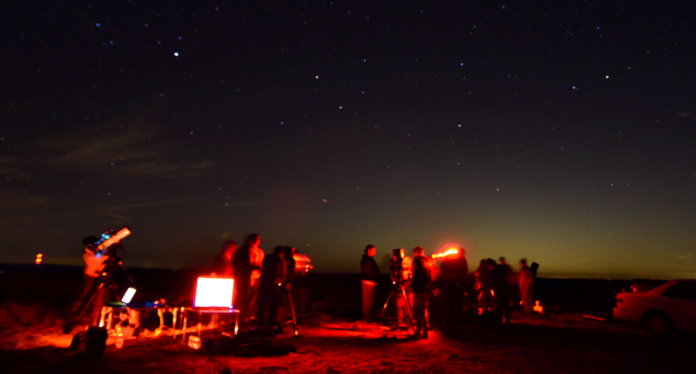
The moon will glow red this Sunday, when a total lunar eclipse will be visible in the Macon area. If the weather cooperates, people should be able to see the celestial event from anywhere, but they can get a magnified view from the Mercer campus that night.
Mercer associate professor of physics Dr. Matt Marone plans to set up a couple telescopes on Cruz Plaza and has invited students and the community to come take a closer look.
“The moon doesn’t produce its own light; it’s only showing us reflected light,” Dr. Marone said. “When the shadow of the Earth is blocking the light from reflecting off the moon, it gets eclipsed. It’s as simple as that. The moon moves into Earth’s shadow.”
On Sunday, people may start to notice the moon darkening around 9:30 p.m. as the Earth’s shadow moves across it. The moon will be fully eclipsed by around 11:30 p.m. and look red due to how the sunlight is passed and refracted through the Earth’s atmosphere.
The total eclipse or “blood moon” will last about an hour, and the moon will be back to its normal glow by 3 a.m. Monday.
“You can see it from your backyard. The moon is so bright that it’s going to be really obvious when it starts to disappear,” Dr. Marone said. “Stay away from light as much as possible.”
Lunar eclipses are not very rare. They happen several times a year, but they are not always total eclipses. It all depends on the location where they are being viewed, and partial eclipses may be barely noticeable, Dr. Marone said.

However, Jan. 20 will be the last chance to witness a total lunar eclipse for a little while. There won’t be another one visible from Earth until May 2021, according to NASA.
Weather permitting, Dr. Marone and his astronomy students will start their viewing party on Cruz Plaza around 10 p.m. Sunday. Depending on the conditions of the sky, the telescope will magnify the view of the eclipse by tens or hundreds of times, compared to viewing it with just the naked eye. Attendees will also be able to look at craters on the moon.
“It’s always important to encourage people to learn more about science, so this is a great way for them to see something unusual,” he said. “It’s definitely an exciting thing for a lot of people to see. You’ll be surprised at the view, how good it is.”
Dr. Marone hosts a few public astronomy events each semester. As part of his astronomy class (PHY 115), he always does a Sidewalk Astronomy night. His students record the responses of other students and community members as they look through telescopes set up on campus. He said it’s a first-in-a-lifetime experience for some people, and the students reflect on being able to help provide that new opportunity.
Mercer will have more opportunities for public outreach through astronomy in the future after an observatory is built off campus. The University had been leasing about 160 acres in Crawford County to use for Dr. Marone’s astronomy lab classes and bought that land last summer.
If the weather is clear, Dr. Marone and his students transport telescopes and other equipment to the site once a week to observe the night sky.
While a timeline has not yet been established for completion of the observatory, preliminary designs have been created and a large telescope has been acquired to go inside it.
The Macon-Bibb Parks and Recreation Department is also hosting a public viewing event for the eclipse Sunday, starting around 9:30 p.m. at Tattnall Square Park. Several telescopes will be set up.
VIDEO CREDIT: This video produced with the Starry Night College, Simulation Curriculum Corp. software shows a simulation of the total lunar eclipse that will visible in Macon on Jan. 20.









